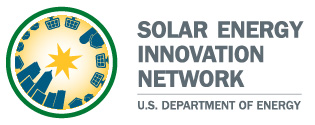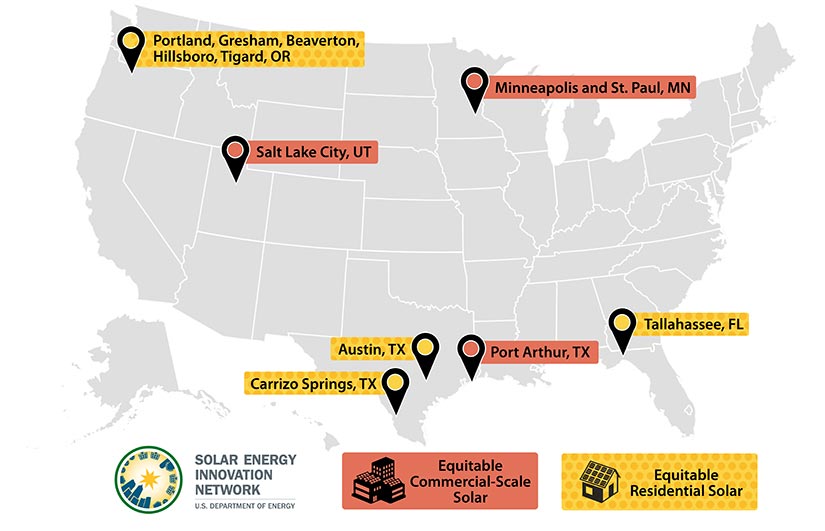NREL To Collaborate With Eight Teams on Innovations To Unlock Equitable Solar in Underserved Communities
Teams Will Receive Direct Funding and More Than a Year of Technical Support as They Explore New Forms of Equitable Solar Adoption in Residential and Commercial-Scale Settings

Solar energy is taking off in the United States. The U.S. Energy Information Agency projects that solar power will account for nearly half of all new electricity-generating capacity in 2022. But this growth is not shared equally across the United States. For example, research published in Nature Sustainability found that Black- and Hispanic-majority census tracts have installed significantly less rooftop photovoltaics (PV) than no-majority and white-majority tracts.
To help address these gaps and ensure that the benefits of solar energy can be shared by all Americans, the National Renewable Energy Laboratory (NREL) has selected eight teams from across the country to join the third round of the Solar Energy Innovation Network (SEIN). The teams will work collaboratively to deepen understanding of the barriers that prevent more equitable adoption of solar energy in underserved communities. NREL will provide analytical support to the teams as they design and test solutions to overcome these barriers in their communities.
New Solutions for New Communities
Common themes across the projects include developing solar financing mechanisms and frameworks, implementing solar-plus-storage in underserved communities, and fostering new practices to ensure that solutions meet the needs of the community. SEIN teams are focusing on communities that are often both racially diverse and composed of low-to-moderate income households. Key drivers of and effective approaches for solar adoption may differ from those found in the higher-income households that have traditionally adopted solar in larger numbers.
“By providing direct funding, technical expertise, and facilitated stakeholder engagement all in one program, SEIN helps teams effectively identify, research, and respond to the unique barriers and needs of communities that have seen limited solar adoption to date,” said Eric Lockhart, who leads SEIN at NREL.
SEIN, which began in 2017, has completed two previous rounds. Round 3 teams were selected in December 2021, and over the course of 15 months, they will discuss challenges, share ideas, and stress-test their solutions. At the end of their projects, teams will publish their findings as blueprints for others. They will also gather with other organizations that are interested in similar efforts at an NREL-hosted symposium.
Meet the Teams
The Round 3 team projects fall broadly into two cohorts—equitable residential solar and equitable commercial-scale solar—both of which share common challenges and goals.

Elevating Equity in Residential Solar Deployment
This cohort focuses on developing solutions that expand equity in residential, behind-the-meter
solar deployment. Many of these teams aim to boost solar outreach and education within
underserved communities. Teams are considering community workshops, solar ambassadors,
and workforce development programs—among many ideas—to highlight how the different
benefits of solar energy can match the unique needs of each community.
The following teams were selected:
New Pathways for Equitable Rooftop Solar in Texas
Lead Organization: Texas Energy Poverty Research Institute
Location: Austin and Carrizo Springs, Texas
This team is identifying opportunities to more equitably deploy solar to properties owned or rented by families in underserved communities by leveraging utilities’ low-income energy efficiency programs and Weatherization Assistance Program funding. This team is collaborating to identify, refine, demonstrate, and evaluate strategies to widen access to residential rooftop solar among underserved communities and develop guidelines and implementation approaches to apply identified pathways.
Multi-Stakeholder Team Members: AEP Texas, Austin Energy, Colony Park Community Development Corporation, Colony Park Neighborhood Association, Community Services Agency of South Texas, Frontier Energy, Houston Advanced Research Center, National Association for the Advancement of Colored People (NAACP) Austin, Texas Solar Energy Society, and Travis County.
Reducing Barriers to Solar in Tallahassee's Low-to-Moderate Income Neighborhoods
Lead Organization: ReThink Energy Florida Inc.
Location: Tallahassee, Florida
This team plans to unlock the market potential for solar PV in low-to-moderate income (LMI) neighborhoods by evaluating technical potential, economic feasibility, and financial tools and programs. The project aims to provide a pathway to install solar at a neighborhood scale that can be replicated in other LMI neighborhoods through awareness of solar benefits in underserved communities and business awareness of LMI funding opportunities.
Multi-Stakeholder Team Members: City of Tallahassee, Greater Bond Neighborhood Association, Greater Frenchtown Revitalization Council, Griffin Heights Neighborhood First Plan, Jacobs Law Office, Public Private Partnership for Sustainable Community Development, and Solar Energy Loan Fund.
Solar Ambassadors for Oregon Communities
Lead Organization: Energy Trust of Oregon
Location: Portland, Gresham, Beaverton, Hillsboro, and Tigard, Oregon
The team aims to address solar deployment barriers and disproportionately low solar awareness in Black, Indigenous, and people of color (BIPOC) communities of Portland, Gresham, Beaverton, Hillsboro, and Tigard, Oregon. The team will work to identify pathways for installing solar on BIPOC homes through innovative incentives for solar-related energy retrofits and home upgrades. The team will also build a network of BIPOC "Solar Ambassadors" to educate and build capacity in their respective communities.
Multi-Stakeholder Team Members: Adelante Mujeres, African American Alliance for Homeownership, Community Energy Project, Portland Community Reinvestment Initiative, Solar Oregon, Unite Oregon (Clackamas Chapter), and Verde.
Fair Solar Lending for Historically Underserved Neighborhoods in Austin, Texas
Location: Austin, Texas
This team aims to address energy affordability and reliability in communities that have historically been negatively impacted by discriminatory housing practices and unjust lending programs. The team will develop community-based research models and leverage peer-to-peer information exchange to define pathways for adapting and expanding low-to-zero-percent interest solar loans for underserved neighborhoods of Austin, Texas.
Multi-Stakeholder Team Members: Austin Energy and GAVA (Go! Austin/Vamos! Austin).
Elevating Equity in Commercial-Scale Solar Deployment
This cohort focuses on expanding equity in solar deployment at the commercial scale, such as at offices, warehouses, hospitals, hotels, retail stores, schools, nonprofits, and higher-education facilities. This applies only to commercial-scale solar that is sited within underserved communities. Many of these teams seek to improve the solar financing options available to small businesses and nonprofits, while also expanding solar workforce development opportunities in underserved communities.
Solar for Safety and Success (3S): Commercial Solar, Disaster Resilience, Job Training, and Long-Term Financing
Lead Organization: Houston Advanced Research Center
Location: Port Arthur, Texas
This project team aims to address the lack of knowledge, affordability, and capital barriers to equitable commercial-scale solar. The team will develop an effective, replicable, and scalable approach to implement solar-plus-storage microgrids that build community wealth in underserved neighborhoods of Port Arthur, Texas.
Multi-Stakeholder Team Members: City of Port Arthur, Clean Energy Fund of Texas (TxCEF), Community In-Power and Development Association (CIDA), Digital Workforce Academy Golden Triangle Empowerment Center (GTEC), Entergy Texas, Lamar State College, Port Arthur Independent School District, Port Arthur Transit, Renewable Energy Partners, Social Wealth Partners, and Solar Energy Loan Fund (SELF).
Driving Resilient and Economic Commercial Solar and Storage in Underserved Communities
This team will develop a framework to increase the uptake of commercial solar and storage in underserved communities by engaging community and business stakeholders, hosting community listening sessions, and developing culturally relevant outreach tools and resources that address solar market barriers and economically entrenched energy injustices. Resources will include findings from listening sessions, solar and storage case studies, battery storage incentive program recommendations, and best practices for financing commercial solar.
Multi-Stakeholder Team Members: Rocky Mountain Power, Suazo Business Center, and Utah Clean Energy.
Project Advisory Partners: Centro Civico Mexicano, Intermountain Healthcare, McKinstry, Utah Division of Multicultural Affairs, Utah Office of Energy Development, and Zions Bank.
Advancing Solar for Underserved Small Businesses: New Engagement Practices for Energy and Economic Security
This team is engaging minority-owned businesses in underserved neighborhoods to increase solar deployment. The team is collaborating to apply human-centered design to understand stakeholders’ lived experiences, gain insights, and challenge assumptions. The team is co-creating solutions to reduce inequities in solar adoption, increase business resilience, and build capacity and leadership to sustain ongoing community action.
Multi-Stakeholder Team Members: City of Minneapolis, City of Saint Paul, Great Plains Institute, Neighborhood Development Center, Northside Energy Opportunity Network, Weber Consulting, and Xcel Energy.
Bringing Solar to Houses of Worship Led by Black, Indigenous, and People of Color
Location: Multiple
This team aims to increase solar adoption by houses of worship led by Black, Indigenous, and people of color (BIPOC) by strengthening existing partnerships and scaling up successful efforts. The team will streamline the solar project pipeline of identifying promising locations, presenting proposals, financing projects, and highlighting successes.
Multi-Stakeholder Team Members: Green The Church and Interfaith Power & Light.
A Unique Program Structure Brings Teams Together
Teams comprise diverse stakeholders, and that expertise helps teams ensure that all perspectives are heard, key barriers are identified, and the resulting solutions are robust and ready to be adopted by other communities in other contexts.
NREL, Lawrence Berkeley National Laboratory, and Rocky Mountain Institute are helping the eight teams realize and demonstrate never-before-tried applications of solar energy at the community level by providing them with extensive analytical support, modeling, and facilitated stakeholder engagement.
“It’s exciting to be able to leverage in-depth expertise from these three partner organizations to complement the expertise of the multi-stakeholder teams,” Lockhart said. “Looking beyond our 15 months working with these eight teams, our hope is that a deeper understanding of barriers to adoption and the cutting-edge solutions that these teams develop will support accelerated solar adoption across the United States in ways that recognize and respond to underserved community needs.”
SEIN is funded by the U.S. Department of Energy Solar Energy Technologies Office and is led by the National Renewable Energy Laboratory. Visit the SEIN Round 3 webpage to learn more and sign up to receive updates as the third round progresses.

